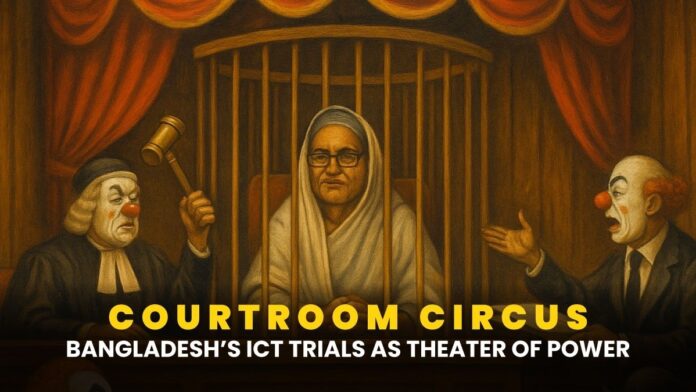Former magic shows had flair. Today, Bangladesh’s international crimes tribunal presents a far more chilling spectacle—a political theater masquerading as justice. With bail virtually outlawed, verdicts seemingly pre-scripted, and the choir of dissent silenced, the ICT’s treatment of Sheikh Hasina’s trial is no less than a judicial pantomime.
The Tribunal as Stage
Once established to address the 1971 war crimes, the ICT now hosts one of the most sensational trials in Bangladesh’s history—against Sheikh Hasina herself, conducted entirely in her absence. The trial, which began in June 2025, has turned into a televised drama featuring drone footage, recorded conversations, and gut-churning survivor testimonies.
From the outset, the trial seems pre-cast.
“A matter of coordinated and systematic violence,” the prosecution declared. The tribunal accepted the case against Hasina in absentia, even appointing an amicus curiae (a court advisor) to stand in.
Contempt = Conviction
No, she didn’t wait for a trial—she received a jail sentence for contempt of court. In July 2025, Hasina was found guilty in absentia, sentenced to six months in prison over a leaked audio where she allegedly proclaimed having a “license to kill”. Talk about turning courtroom drama into dark comedy.
Bangladesh tribunal sentences Hasina to jail for contempt over a claim she had a license to kill
Bangladesh ex-PM Hasina in absentia gets six months in jail for contempt of court
Show Trial or Justice?
The Awami League didn’t mince words. They labeled the trial a “kangaroo court”, orchestrated by an “unelected and undemocratic” regime. No impartiality, no nuance, just political prosecution dressed in robes.
Awami League Slams ICT Trial as Politically Motivated, Denounces Charges Against Sheikh Hasina
A Script Lacking Fairness
Even the United Nations expressed grim concern. In late 2024, UN rights chief Volker Turk noted that the tribunal’s structure and processes “do not meet international rights standards” and urgently called for reforms to ensure fair trials.
Legal experts too warn that the outdated ICT Act—including *no right to self-incrimination, limited appeal routes, and absence of witness protection—is built for political spectacle, not justice.
Absconding Actors, Vanishing Verdicts
The process suffers from practical farce as well: of 206 accused listed in ICT cases, only 73 are in custody—the rest are fugitives.
Some key figures fled abroad before arrest warrants were even issued.
Absurd, but sadly true.
ICT cases over July atrocities: Two-thirds of 206 accused absconding
Theatrics Masking Truth
From contempt convictions in absentia to trials turned into public spectacles, the ICT under the Yunus interim government is less about accountability and more about staged power. The irony? Justice is the prop used to sell fear.
Unless a real judicial reform emerges—complete with fair procedure, impartial judges, rights guarantees, and open defense—the tribunal risks becoming a mockery: a court of spectacle, not substance.





